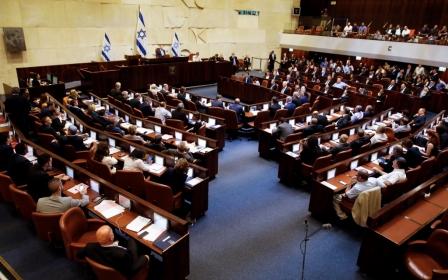Israeli elections: Likud bid to put cameras in voting booths blocked

Israeli prime minister Benjamin Netanyahu’s Likud party failed on Monday in its bid to introduce legislation allowing the installation of surveillance cameras in polling booths for the country's general election later this month.
Opponents of the proposed law accused Likud of seeking to influence the 17 September vote via "racial incitement" after the legislation failed to win a majority in the Knesset's Arrangement Committee, the first step in the legislative process.
The committee voted against the legislation by 12 votes to 11, and one abstention, meaning that Likud has no prospect of passing the legislation before next week's vote.
Adalah, a legal centre for Palestinian citizens of Israel, which had previously said that the bill was primarily targeted at the Arab community inside Israel, said it was "abundantly clear to all that this proposed law would never pass a constitutional litmus test".
But it also said: "This bill – whose sole purpose was to influence the upcoming elections via racial incitement and overt attacks on law enforcement bodies and the very rule of law itself – has already caused harm by injecting bald-faced lies into the public political discourse under the premise of preserving the 'purity of elections'."
New MEE newsletter: Jerusalem Dispatch
Sign up to get the latest insights and analysis on Israel-Palestine, alongside Turkey Unpacked and other MEE newsletters
The failure of the legislation was welcomed by Netanyahu's rivals.
Ayman Odeh, a member of the Knesset and the head of of the Arab Joint List, tweeted that the “cameras bill falled and Netanyahu is going to figtht a battle against the Arab community, the justice system, and the entire democratic domain. Bibi's [Netanyahu’s] sacrifice ceremony is reaching its end. We’ll meet at the ballot box.”
Benny Gantz, the head of the Blue and White Party, welcomed Avigdor Lieberman’s Yisrael Beiteinu decision to vote against the “camera bill” in the Knesset's committee.
“Netanyahu's bluff in an attempt to conceal the loss of deterrence in the south [near Gaza Strip], will not work on Israeli citizens. The only forger in the political system is Netanyahu,” Gantz tweeted.
He later said that Netanyahu is only running away from the “defendants' bench” – referring to the corruption charges that Netanyahu is facing.
On Twitter, the prime minister lambasted Avigdor Lieberman, whose party’s representative was among the 24 members of the Knesset’s Arrangement Committee, and whose vote thwarted the Likud’s camera bill.
“[Lieberman] once said that within 48 hours he would eliminate Haniyeh and now within 48 hours he flip-flopped and went with Ahmad Tibi and Ayman Odeh,” Netanyahu said after the decision, referring firstly to the Hamas leader and secondly to Joint List politicians.
The “camera law” was proposed early in September by Likud, which claimed it was intended to prevent electoral fraud.
But critics of the law saw it as an attempt to deter members of the Arab community inside Israel from voting, after Odeh and Tibi joined forces with Gantz and Yair Lapid against Netanyahu.
Lapid and Gantz’s Blue and White Party are running neck-and-neck with Likud in the polls, meaning that turnout among Palestinian citizens of Israel could be a crucial factor in the final outcome.
Palestinian citizens of Israel make up 21 percent of the population and generally vote for their own Arab parties, or for centrist or left-wing parties.
Middle East Eye delivers independent and unrivalled coverage and analysis of the Middle East, North Africa and beyond. To learn more about republishing this content and the associated fees, please fill out this form. More about MEE can be found here.




